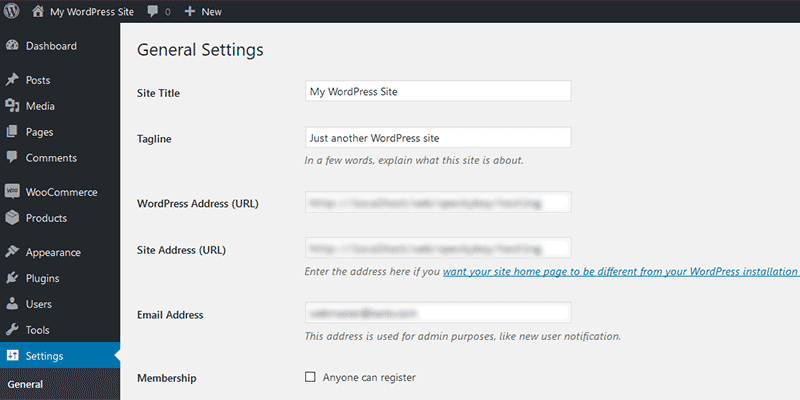A SEO Checklist for Your WordPress Website
A website, no matter how amazing it looks or how great the content, isn’t worth much if people don’t know it exists. That’s why SEO generates a never-ending stream of hype. A well-optimized site is much more likely to be found through organic search.
If your site has been built with WordPress, then you’re already off to a great start with the optimization process. WordPress is built with SEO in mind and it’s flexible. That means you can build a SEO strategy that matches your particular needs.
But there are some things you need to be aware of when it comes to optimizing a WordPress website. Beyond the standard SEO practices, the open nature of the platform means that you’ll need to inspect your theme and plugins to ensure you have the best possible setup.
With that in mind, here is a handy SEO checklist for optimizing your WordPress website:

Check WordPress Settings
WordPress has a few settings that will certainly have an effect on SEO. But when you’re rushing to launch a site, it’s easy to forget about them. Before your site goes public, make sure to check out the following items:
Settings > General
Ensure that both the Site Title and Tagline fields are set correctly. While we usually set the Title while installing WordPress, the Tagline often stays set to the default “Just Another WordPress Site”. If you’re not paying attention, it will show up in your search listings. Feel free to either change the Tagline to something more relevant or delete it altogether.
Settings > Permalinks
WordPress generally comes with SEO friendly Permalinks already set. But it’s still worth fiddling around with to make sure you have the best setting for your type of site. The Post Name option is usually just fine. But if you publish often, Day and Name or Month and Name may be more appropriate.
Settings > Reading
While a site is still in development, often times we might block search engines…then forget to unblock them after launch. It’s best to check the Search Engine Visibility setting before launching your site – just in case.

Make Sure Your Theme Uses Proper Markup
A well-made WordPress theme can have a very positive impact when it comes to SEO. But older or poorly-coded themes could make it harder for search engines to appropriately index your content. Here are some items to look for in your theme:
HTML5 Semantic Markup
At the very basic level, you’re looking for a theme that contains HTML5 semantic markup. This means that content areas are marked with tags such as header, footer, article and aside. Navigation should be wrapped in a nav tag. And page/post titles should be wrapped in h1 headings.
The beauty of these tags is that they provide search engines with some context when analyzing your site. While your site may not look differently to the naked eye, search bots will see this markup as a way to more efficiently index things.
Structured Data
On the higher end of the feature scale would be the inclusion of Schema.org structured data. Descriptive attributes are added to tags for things like events, reviews or even a person. Breadcrumb navigation is also quite useful here. This provides search engines with extra information that could be displayed in search results. For example, if you’ve ever noticed a star rating in a listing – that comes from structured data.
If you build your own WordPress themes, this is something fairly simple to strategically add in. But if you’re using a third-party theme, you’ll want to check to see if it’s included. No worries if it’s not in your theme, though. You can still add this data through various plugins.
Mobile Friendly Responsive Layout
Whether you build your own theme or use a third-party offering, it simply must work well on mobile devices. This is not only a usability issue; it also pertains to SEO as well. Google will mark sites that aren’t optimized for mobile devices in search results. That could cost you precious clicks and sales.

Install SEO-Boosting Plugins
There are a number of great SEO related plugins for WordPress. Which one you choose really should come down to your needs and personal preference. Yoast SEO is a great all-around choice and has over 5 million active installs. All in One SEO Pack has over 3 million active installs and is also a solid pick. They’re two of the most well-known and popular plugins but they’re far from the only ones available.
Regardless of the plugin you choose, there are some standard features that you’ll want to have:
Optimize Individual Pages and Posts
SEO isn’t just about your home page. All of your content should be optimized in some way. A plugin that enables you to individually optimize each page and post is a great help. Things you’ll want to change include titles, keywords and descriptions. It’s also handy if you can individually turn off indexing for a specific piece of content.
Automatic Optimization
For the content you don’t necessarily want to fine-tune yourself, it’s nice if a plugin will do some of the work for you. A good SEO plugin will allow you to change title, description and permalink formulas to automatically tweak things in the background.
Add OpenGraph Data
OpenGraph data is imperative for allowing your content to be shared on social media. It grabs items such as page titles, featured images and excerpts for display on services like Facebook and Twitter. You’ll want use a plugin that adds these tags to your site and allows you to customize settings.
XML Sitemap
Submitting a XML sitemap to Google is an easy way to ensure that they can index your content. Look for the ability to both create sitemaps and customize what content is (and isn’t) included within them.
Analytics
Don’t forget about analytics! Whether you use Google’s service or someone else’s – add tracking code through a plugin or your theme. It’s the best way to find out whether your strategies are working.
These features may all be included in just one plugin, or you might use a combination of niche plugins to accomplish this functionality. Either way, your site should be taking advantage of each item on the list.

Maintain Best Practices in Content
The same SEO best practices for content writing and markup still apply when using WordPress. Since there are plenty of resources on the subject, we won’t go into great detail here. But in general you’ll want to comb through your site and check for the following:
Proper Use of Heading Tags
This one still trips up some people because the classic WordPress editor doesn’t make it so obvious. Content writers will often separate distinct sections within a page with bolded text, rather than the more semantically-correct h2 tag. The new Gutenberg editor, slated for launch in WordPress 5.0 may help in that adding headings will be a bit more of an intuitive process.
Use Internal Links
When you have other related content within your site – link to it. It’s something recommended for SEO and also may encourage visitors to dig deeper into your content.
ALT Text for Images
Images within your content should contain alt attribute text. This is vital for accessibility and Google recommends it for SEO as well. If your site is rather large, you may want to use a plugin to help you find and assign descriptive text to save some time.

You Are Officially Optimized
The combination of the right theme, plugins and content strategy can make your WordPress website fully optimized for search engines. And with so many outstanding tools available, you can mix and match to achieve your goals.
So, whether you’re launching a new site or maintaining an existing one, take the time to go through the checklist above to ensure you’re doing all you can with regards to SEO. A little bit of effort can make a huge difference in your results.
:) Hit link to watching video...! https://ift.tt/2mjne8E
Contributer : 1stWebDesigner
 Reviewed by mimisabreena
on
Friday, June 01, 2018
Rating:
Reviewed by mimisabreena
on
Friday, June 01, 2018
Rating:















No comments:
Post a Comment